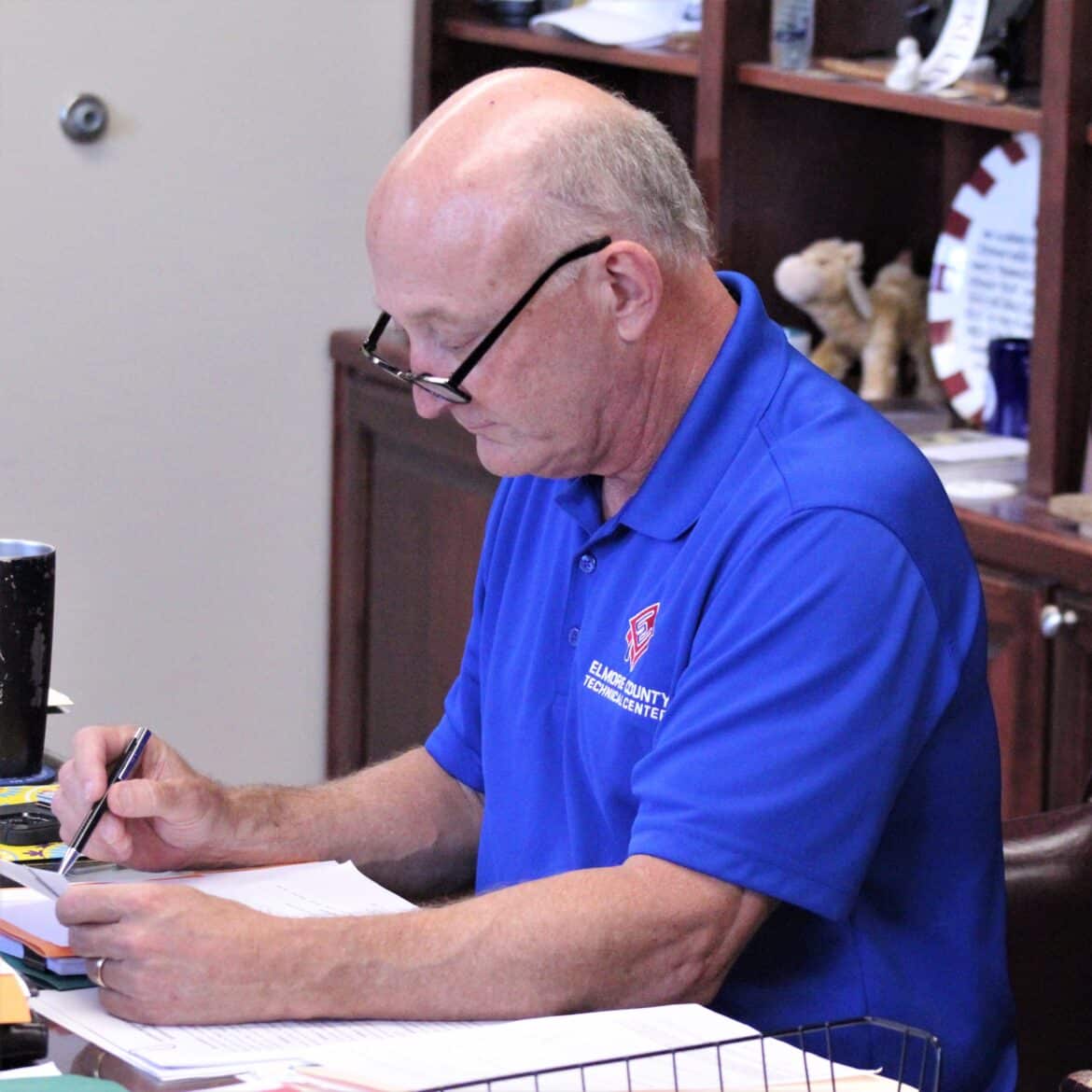By Hamilton Richardson
Elmore/Autauga News
Top Photo: Autauga County School Superintendent Tim Tidmore, Director of Student Services Tisha Addison and Director of Curriculum and Instruction and Elementary Supervisor Cathy Loftin
The safety of students is always a topic of major importance every year for school districts across the country but with another school shooting occurring about a month ago at Robb Elementary School in Uvalde, Texas, the issue has once again risen to the top of everyone’s priority list.
In an interview with Autauga County School Superintendent Tim Tidmore and Elmore County School Superintendent Richard Dennis, both men shared what their systems have been doing and are currently working toward to tackle this difficult issue.
“By law, we have to practice an intruder drill within the first 30 days of every semester,” said Tidmore, who was joined in the interview by Director of Student Services Tisha Addison and Cathy Loftin, Director of Curriculum and Instruction and Elementary Supervisor. “You’d like to think you’re prepared but until something happens, you never know.”
Tidmore said the school system has a very detailed school-specific crisis management plan, which is not published for obvious reasons, he explained. Those plans are housed within a school safety platform, called the nSide Platform.
“The beauty of the drills to me, besides just practicing those so that becomes automatic, especially for children and adults too, is that it gives us an opportunity,” said Loftin. “I know when I was a principal, it gave me an opportunity to see where I had gaps or see where there were holes and to shore those up.”
Addison added, “In addition, we have bus drills as well because things can happen on the bus as well.”
“We’ve got good plans,” said Tidmore. “Plans are subject to being evaluated every time you have a drill. We stress that our exterior doors are locked. We reinforce all that at the beginning of school year and usually at the beginning of school, everybody’s, everything’s operating the way it should be.”
Tidmore began to lay out the technological aspects of the school’s safety strategy.
“All of our buildings have been digitized in that platform so in the event we had something happen, then we can move all our cameras over to the appropriate agency and they can actually take control of the cameras,” he said. “We would give access to law enforcement.”
The superintendent said the network the system uses is called Eagle Eye.
“It’s a filing cabinet. It files all our camera servers,” Tidmore said. “They don’t have unfettered access to it (unless) something happens.”
He commented that he can log in to the system, which he said is cloud-based, from an app as well as administrators at that particular school.
All of the buses have something similar, but it is a transportation platform.
“All 40 of our new buses will all have three cameras per bus with audio,” he said.
School Resource Officers (SRO) are also a tool many school districts are making sure to have at their disposal and Autauga County is no different.
“We have nine resource officers for the entire district,” Tidmore said. “It’s shared between the city police and the Sheriff’s Department. Every school has security personnel. Resource officers are more appropriate at some schools over other schools. These are armed SRO’s.”
There are also school-based safety coordinators getting training, he said.
“We were awarded a bid for security vestibule entrances at our schools that currently do not have them,” the educator continued. “These are entrances where the visitor has to go in this one door and then get buzzed in. All the schools will eventually have them. There will be seven or eight new ones in the new year.”
Another topic of discussion that has hit the news as of the recent shootings is the mental health aspect and Tidmore addressed that issue as well.
“Our approach to school-based mental health (is) trying to involve our social workers to be proactive and not just when a kid has gotten in trouble, but look for those signs,” he said. “We need a school-based mental health or a social worker in every school. The signs are there and it’s not the school’s fault that we don’t have the personnel. I’ve got teachers who have 30-plus kids in a classroom and we train our teachers in Mental Health First Aid (training in mental health and substance-use issues) and we teach them to be on the lookout and see if there’s any small change. Because we know as educators that any kind of behavior change or attitude change or grades drop, something’s not right.”
Loftin added, “I think we’ve equated supervision with safety. We’re talking to teachers, we’re talking to administrators and probably one of the biggest things they discuss with their faculty is that they are supervising their students, but innately built into that is the safety of their students. It’s the whole aspect of seeing big picture but within that big picture, what are the details that might be an issue?”
“We have school counselors at the schools, as well that are our ears,” said Addison. “As soon as they’re (the students) having a problem, they’re going to the school counselor and then they alert one of the mental health counselors to provide guidance and work with the parents.”
Tidmore said that he believes that it is a key for children to know they can talk with someone about how they’re feeling or struggles they are having. It’s also important for the students themselves to watch out for their friends.
“The kids helping the kids if they are in trouble or want to harm themselves,” he stated.
One way to help kids look out for each other is a program called Peer Helpers.
“It’s kids helping other kids,” said Tidmore. “We’ve got kids who have been selected and trained for conflicts.”
“It’s like a relationship,” said Addison.
Another technological advancement that Autauga County schools use is a system called Go Guardian.
“With all of these devises that we have purchased, we have to verify and certify that they are compliant,” commented Tidmore. “Go Guardian is a management software that I can tell you where every Chromebook is at any given time but not only that, say a student is typing in, ‘how do you kill yourself?’ or ‘how do I get a gun in school?’. Those phrases are flagged and the counselor and administrator get an alert. We have protocols in place and steps that the counselors and the administrators have to follow to take care of those before you can clear out that incident. You’d be surprised. Kids are on their devises at 3 a.m. in the morning. Kids and parents think they won’t get caught. It’s made an impact.”
As far as the controversial question of whether teachers should be armed, Tidmore said it would be a difficult thing to manage.
“It would be difficult for any teacher or administrator to carry a loaded weapon and to use it,” he said. “I mean, you’ve got too many emotions going on. As teachers, we have favorite students. If you’ve got a straight-A student and something has happened and she brings a weapon and she’s going to shoot the school, you’re going to have a harder time taking that person out. As opposed to the kid who could be in trouble all the time. I don’t think I could, like a police officer, approach each situation with the same frame of mind because we get invested in our kids.”
He added, however, that he did not have an issue with SRO’s having a secured area in the building with firearms more powerful than a sidearm in case a situation occurs where that is needed.
In the end, even with policies and procedures in place, Tidmore said it comes down to people caring for each other.
“I rarely go anywhere, like a football game or church, where I’m not looking around,” he said. “A lot has to do with cell phone and internet use. It’s easy to talk bad about someone online on Facebook. We’ve lost the humanism. We’ve become anesthetized.”
Loftin added, “We want to teach children to listen, which is a skill for sure. As adults, we know, and as leaders, we know that so many times, people just need to be heard.”
The superintendent ended the interview saying, “It’s about people who don’t know how to be good humans. It’s not about somebody accidentally leaving a door open or making sure its latched, it’s just indicative of how our society has gotten. It’s more of a ‘me’ society than a ‘we’ society.”
ELMORE COUNTY SCHOOLS

Elmore County School Supt. Richard Dennis faces the same challenges in Elmore County.
Dennis had just finished a principals meeting at the time of the interview and had walked through a safety checklist with his people.
“Over the last five years, we’ve tried to go in and put checkpoints where you have buzz in doors in all of our facilities,” Dennis said as he looked over the items on his checklist. “Most recently, we’ve gotten the two high schools in rural areas, Holtville High School and Elmore County High School, completed this last year.”
Dennis said as a part of the school vestibules being installed and those that are currently in use, a background check system is utilized.
“We use Raptor,” he said. “If you’re a visitor, we have them go through a background check through our Raptor system. You have to give a drivers license to get in school.”
Three schools are currently being retrofitted for the vestibule system.
“We actually just got it back this past spring from the Building Commission. They’re supposed to be working on the buzz-in doors at Airport Road, which secures their front door,” Dennis explained. “The other would be Wetumpka Middle School, which does not have a vestibule area so we’re going to reconfigure their main office and use their front entry area as a vestibule area. With those completed, the only one left will be Wetumpka High School as far as a secure entry area.”
Dennis said that new construction taking place at the Elmore County Technical Center will account for a new vestibule area there as well.
“All of our child development centers secure their building during the day, so their doors stay locked,” he added. “We’re also looking at our central office and providing a checkpoint there.”
Perimeter fencing has also been on Dennis’ list of priorities.
We’ve added perimeter fencing around the buildings so you can’t get to the building except through that checkpoint, and we still have two spots at Wetumpka High School that we have to complete to secure it,” he said. “All of the schools have perimeter fencing now but some are are impacted by current construction. The fence at Stanhope Elmore will have to be moved because they’re still working on their old gym and cafeteria. The goal would be to have all areas to the school secured from just walking in.”
All Elmore County schools have either complete perimeter fencing or are in process of getting them completed.
Resource officers are also in-place in Elmore County, said Dennis, but one new tool should improve school safety.
“We have local municipalities that we work with and the Sheriff’s Department that we work with,” he said. “The thing we started in May, Ricky Lowery used to be with the Sheriff’s Department and has retired. We reached out and brought him in as our Security Liaison between us and all local law enforcement. He’ll also oversee our security program. He’s going to survey each campus. He’s going to see things from a law enforcement perspective that we don’t see.”
Dennis said that officials are trying to put an SRO in every school, as well as training staff and faculty and reevaluating policies and procedures.
“We’ve got a lot of policies and procedures in place, but like we saw in Texas, they’re not going to work if you’re not adhering to them,” he said. “Having a secure perimeter is great but if the doors are propped open or if the gate is not secured, then it’s not going to work. He (Lowery) will be tasked with going around to test the procedures.”
To tackle the mental health aspect of the problem, Elmore County does have counselors, although more are needed, Dennis said.
“You have a counselor for every 500 students and those counselors are working with students on scheduling. They own so many different components of the school schedule,” he said. “They’re not really prepared to go in and counsel students with significant emotional behaviors.”
The county does have a Mental Health Coordinator in the system, Rashawn Blassingame, who coordinates with the schools and local agencies and she joined the interview with Dennis.
“Some of our employees are trained in the Mental Health First Aid and that is preplanning to prepare everybody in case a suicidal situation was to take place or how to prevent it,” Blassingame said. “We have a system with our Chromebooks that if a student types in something that has to do with self-harm, it’s a relay system and it comes to us, because the word ‘die’ is in it or the word ‘knife’. Some parents are so appreciative and so thankful. We have to take everything seriously. We’ve put out some fires like the kids looking up bomb threats. We’re getting into the new norm, which is See Something, Say Something.”
Cameras in each school have also been important, although according to Dennis, there just isn’t enough funding to cover every possible area.
“We looked at putting them in every class but the cost is so significant, we weren’t able to do that,” he said. “We’re trying to cover PE areas, break areas, the gymnasium, the cafeteria.”
As far as the superintendent’s perspective on the armed teacher question, he said, “I think it creates a more unsafe situation. I think having trained personnel (SRO’s) that are able to do it, I don’t have an issue with that.”
Beside letting parents and students know that there are clear policies and procedures and making sure a hard copy of the school handbook gets out to everybody, Dennis said it comes down to school culture to solve many safety issues.
“We’re trying to get your students and your culture to where the students are reporting things that are happening,” he said. “You really have to work on your school culture and the climate of your school so that all of it improves to the point where you don’t have harassment and bullying going on but you have a situation where students are comfortable enough to report situations with specifically weapons, and not just weapons, but weapons do fall into the category.”
Dennis added that recent events have caused societal volatility, which has penetrated the schools.
“The reality is that there’s so much instability out there these days, and especially what we see from the post-pandemic mental state where people are exhibiting some unstable behaviors,” he said. “Post-pandemic has really altered people’s perspectives on things and created some instability with people and the students, unfortunately, that have been sheltered and been exposed to the fear coming from Covid. It’s impacted them.”
According to Richard Dennis and Tim Tidmore, both school systems have plans in place to increase and improve school safety within their areas of responsibility. They also both agree that the problem goes beyond the school and into wider society and really comes down to the way people treat one another.






